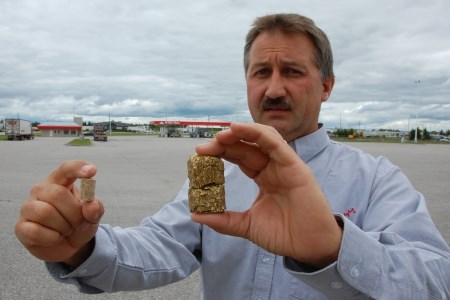Bryan Tardiff had high hopes that his company's biomass wood pellet plant would create hundreds of wood harvesting and manufacturing jobs in northwestern Ontario.
All he needed to make it a reality was access to Crown fibre through the province's wood supply competitive process.
But those dreams were mostly dashed this week when the Ministry of Northern Development, Mines and Forestry (MNDMF) sent him a Jan. 25 dated letter stating that his proposal hadn't met the province's requirements to have access to a portion of the 11 million cubic metres of unused Crown fibre available in Ontario.
Tardiff, a Dryden fuel distributor, had teamed up with log hauler Louie Ricci in making a formal bid for 500,000 cubic metres of hardwood and wood residuals from the nearby English River Forest. The plan was to establish a pellet plant in Ignace, 100 kilometres east of Dryden.
“I have no idea what to say. I guess (Northern Development Minister Michael Gravelle) has got some reason. I guess he was presented with one hell of a proposal.”
Under the umbrella of their company, Far North Biomass, part of the proposal also involved a partnership with the Dryden Development Corporation to supply heat to future tenants at two industrial parks now under construction, as well as to businesses along the community's Highway 17 commercial corridor.
Tardiff and Ricci even teamed up two European green-tech partners to import cutting-edge technology that use wood residuals to generate energy.
Lambion, a German engineering firm, makes high-efficiency boiler combustion systems using low-grade biomass and wood residuals for energy generation.
Tardiff was also set to be the distributor for Gilles Biomass Heating, an Austrian appliance manufacturer, which would bring European wood pellet-fired boilers to North America.
Tardiff and Ricci had even larger plans to develop a series of small biomass generating stations to allow remote communities in the Far North to be more energy independent.
“We wanted the (English River Forest) limits to be allocated to us to manage because there's no way to go to financing without having a definitive source,” said Tardiff.
A disappointed Tardiff said the project will continue but on a smaller scale with a fraction of the potential job creation.
The relationship with Lambion will carry on with a small 2.5-megawatt plant to heat the two industrial parks and the highway commercial corridor, with about 40 tenants in total.
Tardiff has approached private holders with the Dryden Forestry Management Company to get a price and possible allocation of between 9,000 and 11,000 annual tonnes of chips, hog fuel or other biomass residuals.
But their relationship with Gilles was dependent on a supply of pellets.
“Without a wood supply, it's done,” said Tardiff. “Ideally, if we had our pellet plant in Ignace, we would have had an economical supply of fuel for these district energy energy systems. The guys that have fibre now aren't giving it up.”
David Hayhurst, a director in MNDMF's forestry division, who wrote the letter to Tardiff, said it's been a “very complex” process sorting through 115 proposals from competing interests seeking a limited supply of wood.
“We put the proposals through a really rigorous evaluation and it's been overseen by the Fairness Commissioner.”
As of Jan. 26, Hayhurst said 40 unsuccessful proponents have been notified and 20 offers of wood supply have gone out to successful applicants.
“Several of these offers have been accepted and we expect to make more decisions on both unsuccessful proposals, and to make more offers, over the next several weeks.”
Ministry staff are working through technical details and due diligence to finalize the remainder.
Tardiff said he was aware his submission for English River fibre was up against proposals from two major forestry players.
Hayhurst could not speak to any shortcomings in Tardiff's project. That can only be done through a confidential “debriefing” process with the Fairness Commissioner in attendance.
“We'd be glad to follow through on the debriefing.”
Nor could Hayhurst identify any other forestry players bidding for fibre on the English River Forest.
Tardiff said after working two years on the project and spending “considerable” dollars, the province's wood supply process has left him feeling a bit jaded.
“They made a statement that they were looking to change how forests were used and if the proponents that are left in there are the ones that's (being) awarded (wood) to, then they're not looking to change anything.
“We thought we proposed something that would benefit the economies of the communities rather than somewhere else.”
Tardiff was disappointed no ministry personnel ever asked follow-up questions on the technology they were importing.
“I think between the consultants we hired to write it and BDO (Canada), who went through the financials, I think we had enough knowledge there that we didn't miss anything that we could see.”
A nice sidebar piece of business for Tardiff's business would have been to supply veneer to Aspenware, a British Columbia maker of biodegradable cutlery, which has plans to set up a manufacturing plant in Dryden.
“The government's committed fibre to them; I just don't know who's going to do it for them,” said Tardiff.
He wasn't sure of the status of Aspenware's plans. Dryden economic development officer Vicki Kurz wasn't immediately available for comment.




